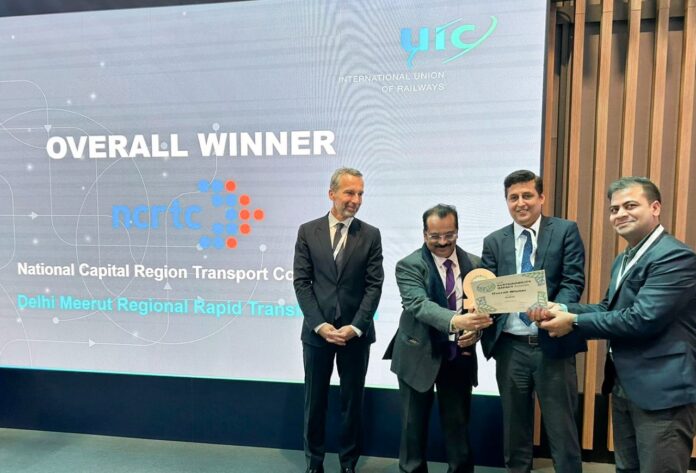New Delhi, Sep 27 NCRTC has been awarded the Best Transit Award for Excellent Connectivity and the Overall Winner Award among global entries at the UIC Sustainability Impact Awards held in Berlin (Germany) on September 25. The award ceremony was organised by the International Union of Railways (UIC) in collaboration with the Sustainable Development Foundation.
NCRTC Managing Director Shalabh Goyal received these awards at Innotrans 2024, the leading international trade fair for transport technology. These awards are in line with UIC’s 2030 “Design a Better Future” vision and the United Nations Sustainable Development Goals (SDGs).
Shalabh Goyal, Managing Director, NCRTC said, “These awards are a testament to NCRTC’s innovative approach of comprehensive multi-modal integration, connecting RRTS stations to existing public transport modes such as metro, buses and railway stations as well as various first and last mile connectivity options. In addition, hybrid Level 3 signaling of European Train Control System (ETCS) Level 2 over LTE will be used in RRTS corridors in the coming days.
The competition is organized by the International Union of Railways (UIC) in collaboration with Vikas Foundation. It aims to honor and showcase the outstanding achievements made in the railway sector across the world. This year’s competition had 17 finalists from 15 countries, including Korea Railroad Corporation, East Japan Railway Company, DB Cargo Group (Germany), Amtrak National Railroad Passenger Corporation (United States), SNCB Assist-National Railway Company of Belgium, Railways from Italy and many other prestigious global railway corporations.
RRTS supports nine Sustainable Development Goals (SDGs), which address critical issues such as climate change, urbanization and gender equality. By encouraging a shift from private vehicles to public transport, the Delhi-Ghaziabad-Meerut RRTS corridor is expected to reduce 250,000 tonnes of vehicular emissions annually, thereby helping make the environment pollution-free.
The use of renewable energy in the RRTS project by NCRTC adopts affordable and clean energy while reducing dependence on fossil fuels, which is a significant step against climate change through significant reduction in greenhouse gas emissions. NCRTC plans to generate 11 MW of solar power on the rooftops of RRTS stations and depots in the next five years under the National Solar Mission, which will further enhance the sustainability of the system.
NCRTC has also adopted Transit-Oriented Development (TOD) strategies to optimize land use to promote high-density and mixed-use urban areas around transit hubs. Through this, it is contributing to the development of sustainable cities and communities in collaboration with municipal bodies in Delhi, Ghaziabad and Meerut.
The NCRTC has organized dedicated women coaches and skill development programs in the train, promoting gender equality. More than 50 percent of the staff involved in operating the Namo Bharat trains are train operators and station controllers are women.
The RRTS project is being developed under the ‘Make in India’ initiative, which makes it at par with international standards. The Delhi-Meerut RRTS corridor will connect with other corridors like Delhi-Alwar and Delhi-Panipat in future.










